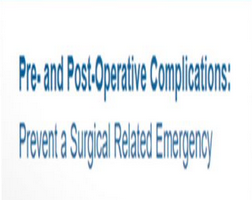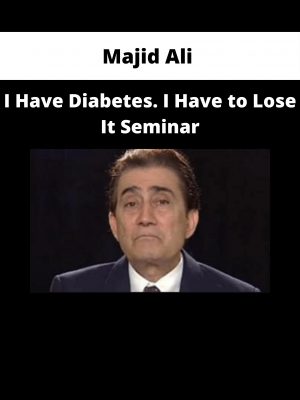Delores “Dolly” Ireland & Dr. Michael Greco – Pre- and Post-Operative Complications
$199 Original price was: $199.$56Current price is: $56.
Shopping Instructions:
- DISCOUNT 15% : SHOP15
- Product Delivery: Within 1 – 12 hours after purchase.
Available for Pre-Order. This product will be available within a few days.
Delores “Dolly” Ireland & Dr. Michael Greco – Pre- and Post-Operative Complications
Pre- and post-operative complications can be fatal if not recognized and treated rapidly. You want to see all of your patients thriving, but surgical complications are tricky…while many pre- and post-operative complications (like potentially–fatal malignant hyperthermia) can occur in the immediate post–operative period, some may present later in the follow–up care. Your patients and their loved ones are counting on your observational and rapid response skills to keep them safe.
If you care for patients who receive sedation, anesthesia or analgesia in the perianesthesia, operative, intervention or inpatient setting, this online course is for you!
Through case studies and the latest evidence–based practice guidelines, two hand–picked experts give you the skills and insights you need to address your greatest clinical challenges and prevent malpractice situations.
Walk away with answers to questions like:
- What are the unique needs of my Obese, Pediatric, Geriatric & Obstetric patients?
- How should I respond to post-operative cardiac and respiratory emergencies?
- Why is one anesthetic used over another? And what does that mean for post-op recovery needs?
- How can false imprisonment laws be broken through use of patient restraints?
- In which circumstances should an endotracheal tube be used vs. laryngeal mask when giving general anesthesia?
- What is the best way to treat post–op nausea and vomiting when these symptoms are impacted by multiple receptors?
Mistakes that aren’t properly cared for have great consequences for the patient, individual nurse and organization…learn to anticipate what your patients need and when to call for help so you, your patients and your facility stay safe!
Module 1
- Anesthesia techniques
- Stages of anesthesia
- Anesthetic agents
Module 2
- Patient controlled analgesia
- Epidural block
- Non–pharmacological interventions
Module 3
- Abandonment risks
- When surgical consents are required and when they are not
- Advantages and disadvantages of electronic documentation
Module 4
- Certification: CPAN and CAPA
- Tips to increase odds of passing
- Test taking characteristics to avoid
Module 5
- Personal malpractice insurance — should you have it?
- Preparing for suspected malignant hypertension response
- Myocardial ischemia
- Waste anesthesia gas
Module 6
- Post–op nausea and vomiting
- Surgical pain — what to expect
- Learn to LOVE your job
Module 1
- Preoperative assessments
- Sleep apnea and surgery
- Symptoms and history that are red flags in preoperative interviews
- Medications to hold on the day of surgery
Module 2
- Advantages and disadvantages of general anesthesia
- Differentiating spinal block and epidural block
- Post–dural puncture headache
- Guedel’s 4 stages of general anesthesia
Module 3
- Inhalation agents & volatile anesthetics
- Opioid types and antagonists
- Neuromuscular blocking drugs
- Depolarizing muscle relaxants
Module 4
- Malignant hyperthermia
- Medications — high volumes, mixing challenges, expenses…
- Population challenges — geriatric, pediatric, obstetric, obese
- Effects of anesthesia on the neurological system
- Why your patient reports of surgical pain
Module 5
- Techniques to decrease postoperative pain
- Principal routes for toxicity
- Lipid rescue
- Emergence delirium
- Cerebral vascular accidents
- Gastroesophageal reflux disease
Module 6
- Post–operative urinary retention
- Electrolyte imbalances
- TURP syndromes
- Pulmonary, venous and fat embolism
- Upper airway obstruction
- Myocardial infarction & post–operative dysrhythmias
- Hypo vs. hyperglycemia results
Would you like to receive Delores “Dolly” Ireland & Dr. Michael Greco – Pre- and Post-Operative Complications ?
Delores “Dolly” Ireland, MSN, RN, CAPA, CPN, has over 46 years of nursing experience with 40 of those years dedicated to the specialty of perianesthesia nursing. She has provided clinical care at the bedside for pre- and post-op cases in all disciplines and has provided leadership and management within the perianesthesia specialty for over 15 years.
Dolly is a sought-after speaker, providing humor and case-based stories to emphasize content topics. She has shared her expertise on the perianesthesia specialty both nationally and internationally.
Michael Greco, DNP, CRNA, CPAN, CAPA, is a certified registered nurse anesthetist, a certified post-anesthesia nurse and a certified ambulatory perianestheisa nurse who currently practices at The New York Presbyterian Medical Center in New York City. He has provided anesthesia care for cases ranging from outpatient ambulatory care to complex open-heart cases. He has also covered labor and delivery services as well as serving as a PACU liaison. His extensive experience in the perianesthesia/critical care arena has not just been limited to the hospital setting. As a past critical care staff educator, Michael had the opportunity to take his skills to the sky and educate flight attendants around the continental US and South America through his involvement with the American Airlines AED program. Recently, he received an honorary discharge from the US Army after serving ten years in the reserves as a nurse anesthetist. Michael has had the opportunity to present to and empower nurses and anesthesia providers not only nationally, but internationally as well.
Learning that Fits YOUR Schedule:
Interact and collaborate with other professionals in the online community through chat boards and online forums. Participants love sharing ideas, asking questions and networking with peers!
Complete your CE tests online at the completion of each module, with instant access to your CE certificates – earn up to 12.1 CE hours.
Related products
Other Courses
Other Courses
Other Courses
Other Courses
Other Courses
Other Courses












